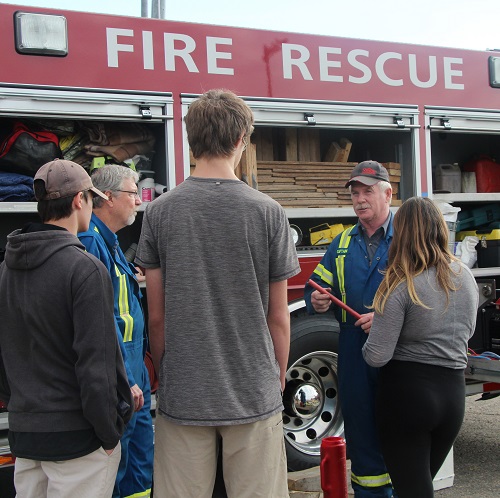
by CONNIE TABBERT
Editor
WHITEWATER REGION (Cobden) — Henri the yoga instructor; Cowboy Chet and George the dairy farmer, as well as a host of many other professions, helped Sean Aiken figure out his passion in life is in teaching or coaching.
But, these professions weren’t in one area — a Hollywood producer at the premiere of Rambo; an air force recruiter in Trenton, Ontario; an aquarium host in Atlanta, Georgia; a bartender in Halifax, Nova Scotia; fashion buyer in New York; a pizza maker in Cape Cod; a cowboy in Wyoming; a florist in Edmonton, Alberta; a park ranger in Hawaii.. and a final job was mayor in his home town.
What do all these people, plus hundreds more, have in common with Mr. Aiken? They helped him find his passion in life, his career.
Mr. Aiken was graduating from university and couldn’t answer the question he’d been asked since he was five years old: What are you going to go do when you finish school?
It’s one of the most asked questions, and for many, they shrug their shoulders and say something to the effect of, ‘I don’t know’, ‘I’m not sure’, ‘Still trying to figure it out.’
In front of about 400 Grade 11 students from across Renfrew County Wednesday morning at the Cobden Agricultural Hall, Mr. Aiken spoke about his life, of trying to figure out what he wanted to do, sometimes using humour, sometimes being serious, but always telling the truth.
He was the guest speaker of the Specialist High
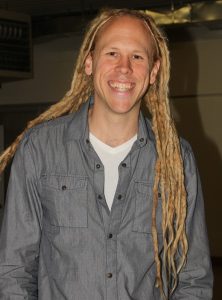
Skills Major program (SHSM).
Alex Harris, a program co-ordinator for Ontario Youth Apprenticeship Program, and Jenny Smith, student success principal for the Renfrew County District School Board, are the leaders of this program.
SHSM allows Grade 11 students to experience different sectors they can focus their studies in, said Mr. Harris, noting that of the 19 possible sectors offered through the Ministry of Education, the RCDSB offers 14 of them, from arts and culture, justice community, emergency services, health and wellness and transportation.
Ms. Smith noted the program is held in Cobden because it’s a central location for the school board, as the Grade 11 students from seven high schools voluntarily participate in the day-long event. They meet at the Cobden Agricultural Hall, listen to a guest speaker and then split off into various certification areas, such as chain saw safety, emergency services, dietary considerations, spa services, fire safety, fire extinguisher, dance, interactive art forms, personality inventory, stress management techniques, wilderness survival and wrapping and taping.
The certifications occurred at many sites in Cobden, such as the ag hall, Astrolabe Arena, curling club, Civitan Hall, churches and businesses, such as Main Street Spa, she said.
The students must complete five sectors of the SHSM program: certifications, compulsory or elective; co-op placement; various course credits, sector partnered contectualized experience (working deeply in a certain sector; and reach ahead (job shadow or attend a post-secondary or workplace and talk to people about what it’s like in a certain sector).
When the students in SHSM graduate, and have completed the full program, they will receive a special seal on their diploma, Ms. Smith said.
Mr. Harris added, “It’s all about bridging that cap between high school and the real world.”
He noted local business owners gave up their time to participate as well as various groups, such as firefighters from the Whitewater Region Fire Department and paramedics from the Renfrew County Paramedics. There are also staff members involved in training.
“It really takes a village,” Mr. Harris said. “It takes a pile of individuals to come and make this happen.”
Ms. Smith added, “We’re really thankful to the town of Cobden for letting host all of our programs here.”
Mr. Aiken stressed that he wasn’t there to inspire them at this moment. But, in moments of time when they were unsure, they were to recall him standing in front of them, talking about 52 jobs in 52 weeks, about how he came about finding his passion – his career.
“I’m interested in a few weeks from now, a few months from now, when you are alone, and by yourself, and perhaps forgotten how important you are and how much of a consequence you are,” he said. “My goal is perhaps I say something you will remember, perhaps you’ve learned something that in those difficult times, you remember a piece of my story that maybe resonates with you that somehow relates to your story as well.”
Looking back to the first time he can recall the most-asked question that each student has heard since being in school. He remembers he was about five years old, just a tiny kid, and had no idea how to answer the question someone asked him, probably pinching his cute little cheeks at the same time — so, what do you want to be when you grow up.
“I had no idea what they meant with this question,” Mr. Aiken said. “I’m like five years old playing in my sand box. I don’t know. Maybe let me be a kid first, like say, for the next 10 years!”
But, knowing the person was waiting for an answer, he said, a superhero.
Getting serious again, Mr. Aiken said, this question was asked so many times while growing up.
“It was an invitation to explore, an invitation to dream,” he said. “What do you want to do, anything is possible.”
But, eventually, when the question was asked, it was with a very serious tone, knowing graduating high school was inevitable. That is when the pressure and anxiety begins to set in as students begin thinking about the choices in their life. When he graduated from high school, he was terrified.
“I had a mask that I wore, it was one of confidence and courage,” Mr. Aiken said. “I had an answer, a thought-scripted answer. I would say, very proudly, I want to be a physiothe
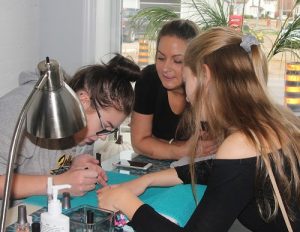
rapist. It would be a good job for me.”
While he had no idea what a physiotherapist did, it sounded important and he hoped people would stop asking ‘that’ question.
A few months before graduating university, his sister put him on the spot and posed that question to him, while at the dinner table one night. “What are you gonna do?”
His mother chirped in, be a teacher. But, it was his father who gave him the answer.
“Look Sean, it doesn’t matter what you do, whatever it is, just make sure it’s something you are passionate about,” he said. “Then he said, I’ve been alive nearly 60 years, and I’ve yet to find something that I’m passionate about.”
Mr. Aiken said he was surprised, because he thought everyone but him knew what they wanted to do with their life, and yet, here was his father, who had worked his whole life, married, had children, and yet, still hadn’t found a career he was passionate about. He had taken the first job out of school and was still at it.
Mr. Aiken then made a promise to himself – to find something he loved to do and do that by trying out different things. He didn’t have a lot of job experience or work experience for a career after school.
“What if I could try out different things,” he thought.
Twenty years in school and he couldn’t tell you about himself or his values, his strengths and weaknesses.
“The opportunity you have here with SHSM is incredible,” Mr. Aiken told the students. “I really hope you lean into and squeeze this program and take every little ounce of goodness out of it that you can, because let me tell you, when you walk through those doors after high school, it can feel very alone quickly.
“Right now you have so many people, whether you realize it or not, so many people, educators and teachers in your life, who would love to help you, that would love for you to lean on them, for you to go up to them and ask them questions about how they figured out what they wanted to do, and this program is a great opportunity for you to get experience.”
He encouraged the students to take advantage of co-op experiences in school, because it will help them determine if a certain career is really for them.
“You will actually learn if something is right for you or not, rather than blindly choosing a career path after high school
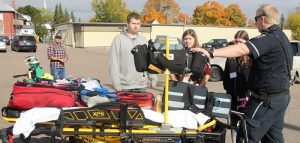
and hoping it works out,” he said.
Mr. Aiken decided to try out a different job for 52 weeks. He told his parents he was going to travel the country and the US, travelling by bus or hitchhiking, sleeping on couches along the way, and any money he raised, he would donate to charities.
So excited about the idea, he went after it. He created a web site and began plotting his year ahead.
“When I had the courage to do so, when I had the courage to admit that I was clueless that I had no idea what I wanted to do with my life, that I was terrified when I was looking at all these career path options and no idea how to navigate that, and it took a long time for me to do that, I had to go through depression, felt extremely lost and alone, kept up at night staring at the ceiling asking myself, why am I here, how could I possibly be here for a purpose. It took a long time for me to come to that,” he recalled.
When the web site was operational, he began getting job offers and phone calls from media for interviews.
“This was amazing, in terms of getting this conversation out to the public, about what does it mean to find fulfillment in work,” Mr. Aiken said.
He travelled North America trying out all sorts of jobs – real estate agent in Beverly Hills; a mascot for the NHL Washington Capitals – something he wouldn’t do again after finding out that all sorts of people had left their bodily fluids on the inside of this smelly suit.
He was a stock trader in Florida –where he lost $1,000 – but the experienced trader found it again by the end of the day.
He met Henri, a 57-year-old man who had become a yoga instructor, in Winnipeg, Manitoba. He did six hours of yoga a day and on the fifth day of that week, taught his first class.
Mr. Aiken said it was Henri who changed his life following a conversation the two had, even though he doesn’t remember the content of the discussion.
“I remember how we interacted,” he said. “We spoke for two-and-a-half hours and it was the bizarrest thing, but it was the first real conversation that I had with somebody in an older generation than myself.”
Many people’s interactions with someone in an older generation usually has no meaning, it’s not a real, deep conversation.
“This changed my life, because it made me realize if there is anything I wanted to learn, there was most likely
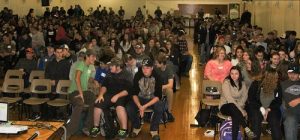
somebody already doing it,” he said. “And if I found the courage to ask for help, to ask for support, they were most likely going to be willing to help me.”
From this conversation he realized it’s “okay not to know. You don’t have to have it all figured out by the time you graduate high school.
“It’s okay not to know. You don’t have to have it all figured out. In fact, you are not supposed to know. How are you supposed to know what you want to do for the rest of your life?”
However, if you have the courage to ask for support, it’s incredible the amount of people who will help you, who have walked down all different types of career paths. He suggested the students talk to those in career paths, have a coffee, take them out for lunch, because they will be willing to stand at the trail path and help you go down it.
Mr. Aiken recalled the radio disc jockey who told him to get active by volunteering and make contacts and keep those contacts, because it’s those contacts who will get you where you want to go.
“It’s the relationships in your life that are actually going to help you the most,” he said. “In reaching out to people, especially in the older generation, lean on them, and learn from their experience, it’s amazing what opportunities can open up from them.”
He called the conversations he had in his week as a cowboy with Chet.
“One of the things we talked about was what does it mean to be successful? What is the difference between success and failure?”
While many people believe failure is the opposite of success, Mr. Aiken said that’s just not true.
“Success only comes from a culmination of failures,” he said. “Only when you allow yourself to fail, and you do so by trying, by trying different things, again, you are under no obligation to know anything about anything you don’t already know. How could you possibly be perfect at something you have never tried. Of course you are going to fail. Great. Please, fail, because that’s how you learn, and you grow, and you get to where you actually want to go.”
Ending his year by being the mayor in his hometown of Vancouver (British Columbia), was a great way to end, Mr. Aiken said.
“I was able to see all the decisions that make the town what it is,” he said.
Friend Ian MacKenzie joined him on this journey filming him and taking stills. The questions asked were what do you like and not like about the job; what would you do differently.
At year’s end, a feature-length documentary was created titled: One Week Job – 1 man, 1 year, 52 jobs.
Mr. Aiken questioned if the long journey really worked — did he find his passion. One of his passions is to explore and help others, possibly in a teaching or coach role.
He also came to realize that passion is more than a job title.
“It’s actually what is in the career that really lights you up,” he said. “Our careers are means of fulfilling and expressing our passion.
“One of the questions you should ask yourself is what is it that make you happy in your career,” Mr. Aiken continued. “What is it that brings you back here every day?”
The people who are the most fulfilled in their life are the ones who are connected to the meaning behind what they do, Mr. Aiken said. It’s more than a job, they can tell you why they do what they do.
“Something is made better because they are a part of what they do,” he said.
One of the examples he used was his week of being a cancer fundraiser in Toronto. He thought it would be sad and depressing, especially since he had just received a call that his mother had breast cancer. But, he learned that those who were planning the fundraising were inspired and hopeful.
“The people who worked there realized that the better job they do every day, the more money they raise for cancer research, is just that much closer to finding a cure,” he said.
Then there was the pre-school teacher in Boise, Idaho, who found happiness when a youngster would tell him he could tie his shoe, or climb a monkey bar for the first time – that he played a part in making that happen was incredible.
He recalled the time he was a dairy farmer for a week with George, the dairy farmer who was wearing brown-crusted overalls, and was passionate about his farming life.
“George, what am I missing here, what do you love so much about doing this,” Mr. Aiken asked.
George said, ‘Sean, people need to eat. I’m providing food for thousands of people in my community and contributing to the environment by using organic farm practices.”
The people most fulfilled are those who know why they’re doing what they’re doing, Mr. Aiken said. Often times it’s connected to something larger than themselves, they are in service to something larger than themselves, he said.
Mr. Aiken’s final story was about Lee, who was a president of a major shareholder company. He was the success of all successes – nice home, cars, he’s got the stuff. While talking with Lee about different jobs, he realized that Lee was off in a world of his own, so he stopped talking. When Lee realized this, he said, “You know what Sean, I wish I could just be a coach.”
Mr. Aiken then asked him what he would do if he could do it all over again.
“He said to me, ‘If I could do it all over again, I wish I would have acted without the fear of what others thought.”
Speaking to the students, Mr. Aiken said, “If you were being truly honest with yourself, ask yourself, how often do you make choices based on fear and based on what other people think?”
He said that’s how he made his choices – what will friends and family and teachers think about his choices.
“I realized that if I continued to make my choices based on fear, based on what other people think, then how could I ever, ever, possibly be fulfilled in what I’m doing,” he said.
Fear means taking a risk, and if you put yourself in a situation where you take a risk, where you make a choice, fear can be an amazing thing.
“It means that you care,” he said. “If you didn’t care about the outcome of something, then you wouldn’t be afraid of it.
“Fear is a sign that you care, and that the choices that you make will have a consequence.
“Fear is an invitation to grow and to learn.”
You will have discomfort at first but then you will have a career that you want and won’t have regrets later in life, Mr. Aiken said.
Looking around the room, he quietly asked, “What would you do if you weren’t afraid?” and then louder asked that same question, “What would you do if you weren’t afraid?”






![Kenopic/Smith Auction [Paid Ad]](https://whitewaternews.ca/wp-content/uploads/2018/10/advertising-100x75.jpeg)

